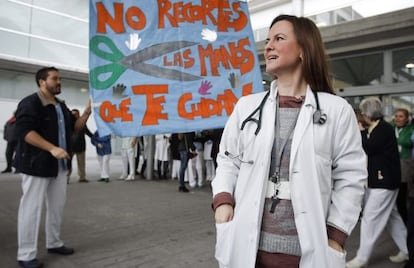“We have demonstrated that the public model is the cheapest”
Doctors associations celebrate Madrid’s withdrawal of hospital outsourcing plans

Patricia Alonso of the Madrid Association of Specialist Physicians (Afem) isn’t hiding her reaction to the Madrid regional government’s Monday announcement that it was abandoning plans to outsource management and services at six public hospitals. “At the moment we’re feeling satisfaction above all else,” she says.
Her association was among those that organized the protests against the privatization plans, both on the streets and in the courts. “We have demonstrated that you can stop a reform that has neither economic nor scientific arguments, and that you can do it in a very honest way. We have demonstrated with legal, professional and healthcare arguments that not anything goes,” she says.
Alonso doesn’t say how much money she has lost through all her strike days, though she admits “it has been a lot.” “But patients have also missed a lot of appointments and have put in a lot of money. Just so as we could take it down the legal route we did a charity collection and raised around 200,000 euros,” she says.
“When they built these hospitals [they were opened with great fanfare by former Popular Party regional premier Esperanza Aguirre over the course of two years] the professionals said they weren’t necessary; that what were needed were centers for medium- and long-term stays, which are much cheaper and give more benefit to society,” says Alonso.
If someone says cuts have to be made because of this decision, they will be trying to trick us"
The Afem board member, who works as a doctor at the Clínico de Madrid, does not want to overly revel in her victory. “This is not an ideological matter, but rather a professional one. The thing was that not at any time did they show us any studies, neither from Madrid nor abroad, saying you can get the same healthcare for less money with private management. There were no economic or scientific reports of any weight. [...] We were just saying to them: ‘Present your figures to us.’ But they didn’t have any. And when we offered them ours, they just mumbled because they didn’t have a response. [...] And we are not talking about small sums. The region spends seven billion euros on health, half of its budget. And what is clear is that what goes to the private firms is taken away from public healthcare.”
Alonso is adamant the cancelation of the outsourcing plans is “no excuse for more cuts.”
“We have demonstrated that the public model is the cheapest, so if someone says cuts have to be made because of this decision, they will be trying to trick us, and it will have to be pointed out.
“For us the head of Javier Fernández-Lasquetty [the former regional health commissioner who resigned on Monday] has no value. [...] What happened was that he himself made it clear that he didn’t have a Plan B. [...] And we think we do. The system needs reforms, of course, but these have to come from consensus and studies, not because of an ideological matter,” Alonso says.
Afem was not the only group to celebrate the Madrid government’s U-turn. The secretary general of the Amyts doctors union, Julián Ezquerra, expressed his organization’s “full satisfaction.” “We want to hear, even though [regional premier Ignacio] González has not mentioned it, that he is also giving up on privatizing the local health centers as he said he had also planned.”
The Madrid Association for the Defense of Public Healthcare (ADSPM) called the withdrawal “a victory for the social and professional mobilizations, which have been going on for a year and a half.” But it warned that “you cannot lower your guard; you have to stay vigilant, because there are a lot of things that they want to privatize.”







































